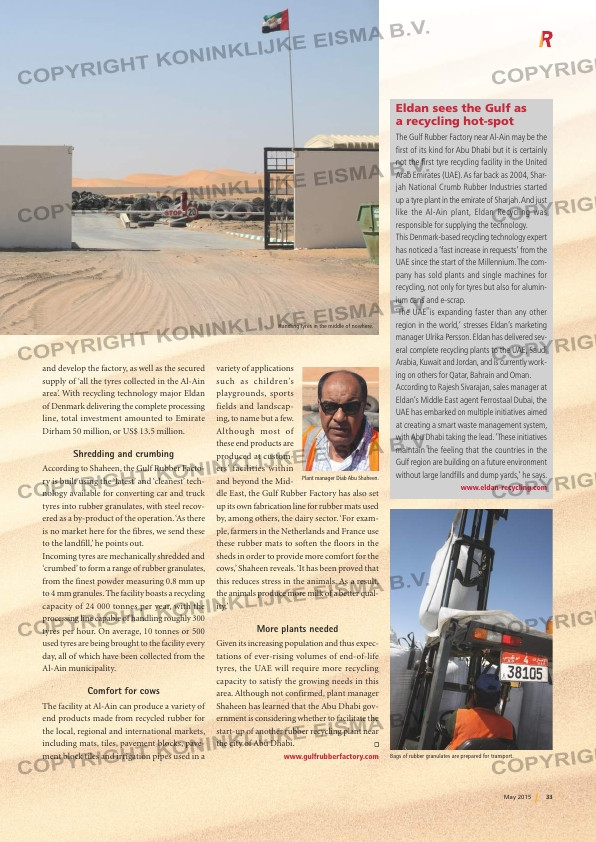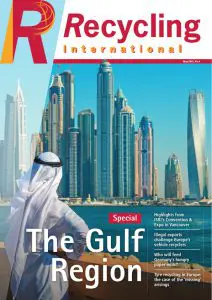Page 33 from: May 2015

and develop the factory, as well as the secured
supply of ‘all the tyres collected in the Al-Ain
area’. With recycling technology major Eldan
of Denmark delivering the complete processing
line, total investment amounted to Emirate
Dirham 50 million, or US$ 13.5 million.
Shredding and crumbing
According to Shaheen, the Gulf Rubber Facto-
ry is built using the ‘latest’ and ‘cleanest’ tech-
nology available for converting car and truck
tyres into rubber granulates, with steel recov-
ered as a by-product of the operation. ‘As there
is no market here for the fibres, we send these
to the landfill,’ he points out.
Incoming tyres are mechanically shredded and
‘crumbed’ to form a range of rubber granulates,
from the finest powder measuring 0.8 mm up
to 4 mm granules. The facility boasts a recycling
capacity of 24 000 tonnes per year, with the
processing line capable of handling roughly 300
tyres per hour. On average, 10 tonnes or 500
used tyres are being brought to the facility every
day, all of which have been collected from the
Al-Ain municipality.
Comfort for cows
The facility at Al-Ain can produce a variety of
end products made from recycled rubber for
the local, regional and international markets,
including mats, tiles, pavement blocks, pave-
ment block tiles and irrigation pipes used in a
variety of applications
such as children’s
playgrounds, sports
fields and landscap-
ing, to name but a few.
Although most of
these end products are
produced at custom-
ers’ facilities within
and beyond the Mid-
dle East, the Gulf Rubber Factory has also set
up its own fabrication line for rubber mats used
by, among others, the dairy sector. ‘For exam-
ple, farmers in the Netherlands and France use
these rubber mats to soften the floors in the
sheds in order to provide more comfort for the
cows,’ Shaheen reveals. ‘It has been proved that
this reduces stress in the animals. As a result,
the animals produce more milk of a better qual-
ity.’
More plants needed
Given its increasing population and thus expec-
tations of ever-rising volumes of end-of-life
tyres, the UAE will require more recycling
capacity to satisfy the growing needs in this
area. Although not confirmed, plant manager
Shaheen has learned that the Abu Dhabi gov-
ernment is considering whether to facilitate the
start-up of another rubber recycling plant near
the city of Abu Dhabi.
www.gulfrubberfactory.com
Eldan sees the Gulf as
a recycling hot-spot
The Gulf Rubber Factory near Al-Ain may be the
fi rst of its kind for Abu Dhabi but it is certainly
not the fi rst tyre recycling facility in the United
Arab Emirates (UAE). As far back as 2004, Shar-
jah National Crumb Rubber Industries started
up a tyre plant in the emirate of Sharjah. And just
like the Al-Ain plant, Eldan Recycling was
responsible for supplying the technology.
This Denmark-based recycling technology expert
has noticed a ‘fast increase in requests’ from the
UAE since the start of the Millennium. The com-
pany has sold plants and single machines for
recycling, not only for tyres but also for alumin-
ium cans and e-scrap.
‘The UAE is expanding faster than any other
region in the world,’ stresses Eldan’s marketing
manager Ulrika Persson. Eldan has delivered sev-
eral complete recycling plants to the UAE, Saudi
Arabia, Kuwait and Jordan, and is currently work-
ing on others for Qatar, Bahrain and Oman.
According to Rajesh Sivarajan, sales manager at
Eldan’s Middle East agent Ferrostaal Dubai, the
UAE has embarked on multiple initiatives aimed
at creating a smart waste management system,
with Abu Dhabi taking the lead. ‘These initiatives
maintain the feeling that the countries in the
Gulf region are building on a future environment
without large landfi lls and dump yards,’ he says.
www.eldan-recycling.com
Handling tyres in the middle of nowhere.
Bags of rubber granulates are prepared for transport.
Plant manager Diab Abu Shaheen.
33May 2015
RI 4-ME_Rubber factory.indd 33 04-05-15 09:17



